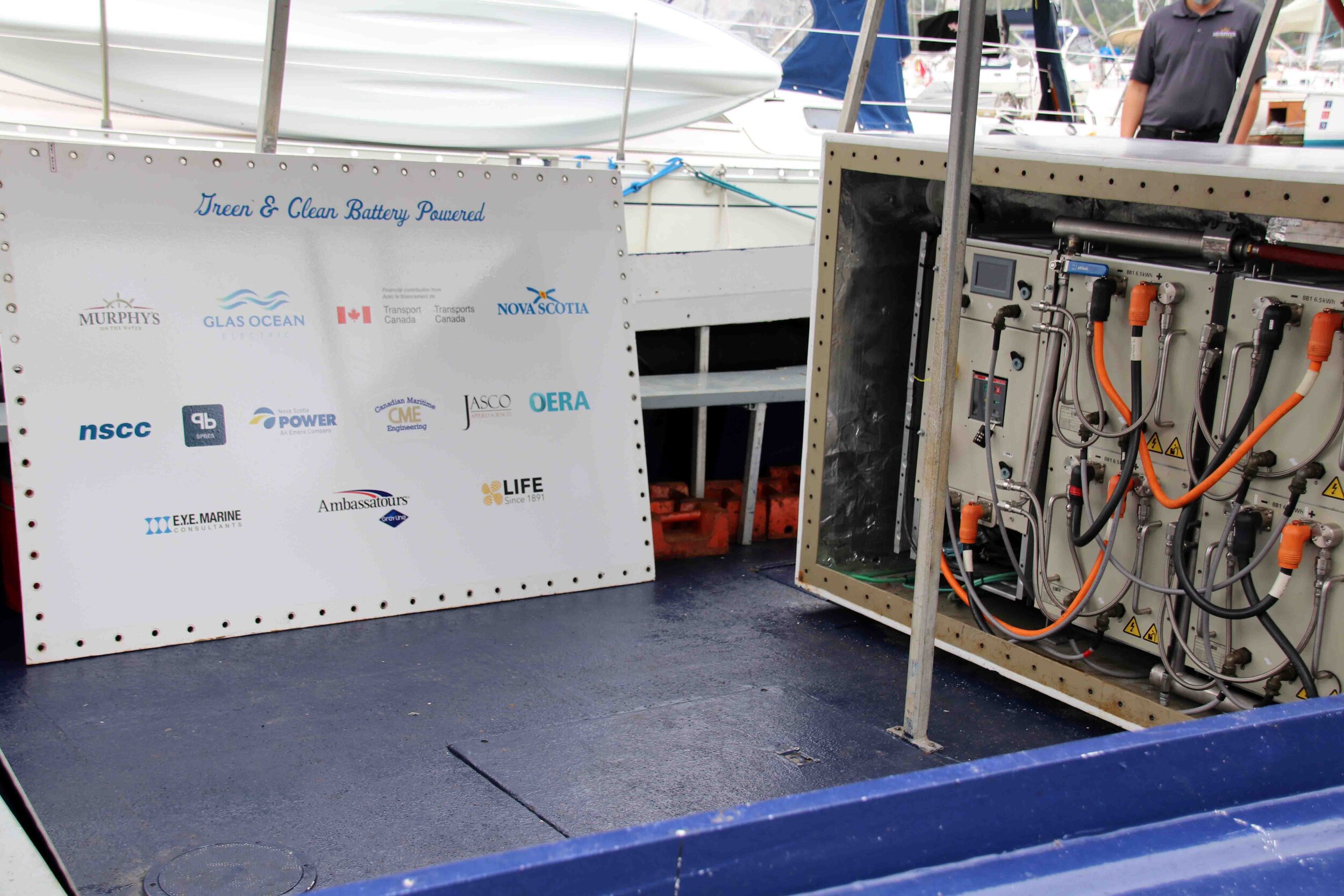Alutasi: A green launch into the blue
/A milestone in ecologically friendly marine transportation for Atlantic Canada was reached on Aug. 12 with the launch ceremony of the first Cape Islander style vessel to be refitted for electric propulsion. Led by Glas Ocean Electric’s Dr. Sue Molloy, Ambassatours’ Peggy’s Cove Express, a diesel-powered tour boat (formerly a fishing vessel), was converted to a hybrid system with a clean, battery-powered electric motor in parallel with the original diesel engine. Renamed the Alutasi, this vessel will be Canada’s first Transport Canada Marine Technology Review Board approved boat using electric propulsion powered by lithium-ion batteries.
JASCO measured underwater noise from the original power train, testing various combinations of transit speed. loading conditions and propeller wear, and will soon repeat the measurements for the newly installed electric propulsion system to quantify the environmental benefits of going electric for this style of vessel.
Following an introduction by Dr. Molloy, the launch ceremony included remarks by Halifax Member of Parliament Andy Fillmore and Energy & Mines Minister Derek Mombourquette.
“It’s only through partnerships like this that we will one day find ourselves winning the fight against climate change. … I look forward to the day where we see many more boats like Alutasi in the waters around the world.”
In place of the customary bottle of champagne breaking over the bow, Mi’kmaw elder Dorene Bernard performed a Water Protector Ceremony and smudged the vessel, which has been renamed Alutasi. The boat has been adorned with artwork by Alan Syliboy inspired by Mi’kma’ki petroglyphs and culture.
“Alutasi is a Mi’kmaw word meaning a boat that guides to the best fishing. Alutasi, Glas Ocean’s electric-powered Cape Islander, is itself a leader, guiding a fleet vital to our Maritime life toward better ways to protect our waters.”
It is estimated that the electric hybrid conversion will reduce greenhouse gas emissions by 40% and underwater radiated noise by 40-60% for a typical trip, which will see the diesel engine used for the fast transit to and from the sightseeing area and the electric motor for the majority of the tour.
“We hope that electric power will become the new norm for marine vessels, reducing greenhouse gases in the air and noise emissions underwater. JASCO is proud to be a part of demonstrating how this technology is feasible for the fishing industry in the Maritimes and the resulting benefits to our marine environment.”
Financial contributions from Transport Canada, Glas Ocean Electric, Canadian Maritime Engineering, NSERC, Nova Scotia Power, Nova Scotia Offshore Energy Research Association, and the province of Nova Scotia supported the project. Reduced commercial rates and in-kind contributions were provided by partners Sterling PBES, E.Y.E. Marine Consultants, Lunenburg Foundry, and JASCO Applied Sciences.
Learn more
For four years Dr. Sue Molloy has been at the helm of Glas Ocean Electric Inc. (Glas meaning ‘green’ in Gaelic), a business committed to scaling cleaner energy to coastal waters. Well known for her extensive work in the marine renewable energy sector, Dr. Molloy is the driving force behind the Alutasi electric boat conversion. She is a lead investigator of numerous ocean research initiatives, an expert in ship propulsion, and an award-winning Canadian representative for IEC and ISO. Dr. Molloy and her team are committed to reducing greenhouse gases and pollution in our coastal communities through the introduction and increased uptake of electric boats.
JASCO has worked with Dr. Molloy in the past modelling noise exposures of marine mammals from vessels based on satellite AIS vessel tracks to enable whale-ship avoidance for the Canadian Space Agency.











